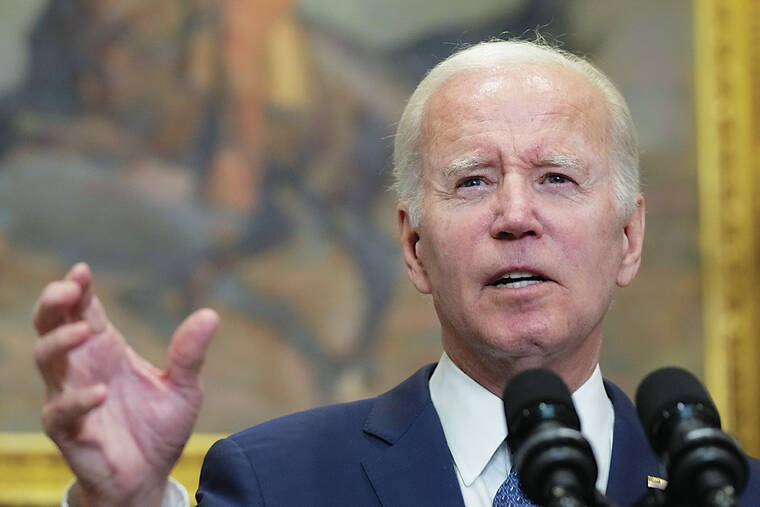Biden’s 2024 pitch highlights pragmatism over Trump’s pugilism
WASHINGTON — President Joe Biden promised voters in 2020 that he knew how to get things done in Washington and could bring stability to the capital. It seemed like a message out of step with the more combative era brought on by Donald Trump.
But Biden prevailed, and as he seeks a second term, he’s again trying to frame the race as a referendum on competence and governance, pointing to the bipartisan debt limit and budget legislation he signed on Saturday as another exemplar of the success of his approach.
The agreement the Democratic president negotiated with House Speaker Kevin McCarthy and other Republicans averted the catastrophe of a U.S. government default — and forestalled another threat until after the 2024 election — while largely protecting the domestic agenda that formed the backbone of what he hopes will form his legacy.
His approach, favoring pragmatism over Trumpian pugilism, will be tested as never before in the coming campaign, with his approval rating even among Democrats low despite the results he has delivered, in large part because of concerns about his age as the oldest person to ever seek the presidency.
“The results speak for themselves,” said Jeff Zients, the 80-year-old Biden’s chief of staff. “This level of support shows that we got a bipartisan deal that, most importantly, protects the president’s priorities. And now we have a runway to execute on the president’s priorities.”
Biden’s allies say his strategy reflects his broader view of the presidency: tuning out the daily chatter and focusing on making a prolonged impact.
“This was quintessential Joe Biden,” said longtime Biden confidant and former Delaware Sen. Ted Kaufman. “He really understands the institutions, how they function, how they interact, and what their limitations are.”
That perceived advantage — longevity — is also perhaps Biden’s steepest hill as he seeks four more years.
Biden, aides said, devised a strategy shortly after Republicans took the House in November and stuck by it through the talks, despite second-guessing from members of his own party. He pressed the Republicans to define their budget priorities, then hammered them in public for unpopular proposed cuts once they did, to enter the negotiations with the strongest hand possible.
“He believes in the institutions of American governance. He’s approached this with an eye toward making the presidency and the Congress work and the way they were designed to work,” said Mike Donilon, a senior adviser to the president.
As the talks progressed, Biden stepped out of the limelight to allow Republican leaders to claim a win — necessary to sell it to their caucus — and quietly reassured Democrats that they would grow to like the deal the more they learned about it.
The result is an agreement that White House aides say exceeded their projections of what a budget agreement would look like with Republicans in charge of the House. It essentially freezes spending for the next year, rather than the steep cuts proposed by the GOP, and protects Biden’s infrastructure and climate laws and spending on Social Security and Medicare.
From the view of Biden’s team, it’s also far better than the result than the debt limit showdown of 2011, when Biden was a negotiator for then-President Barack Obama and House Republicans forced them to accept stiffer budget cuts that they believe hampered the country’s recovery from the Great Recession.
Biden still has come under fire from some in his own party for agreeing to tougher work requirements for some federal food assistance recipients and speeding up environmental reviews for infrastructure projects.
But the White House sees an upside: The permitting changes will speed up implementation of Biden’s infrastructure and climate laws, and the Biden aides highlight that Congressional Budget Office projections show that carve-outs from work requirements for veterans, people who are homeless and those leaving foster care will actually expand the number of people eligible for federal food assistance.
“While the rest of us are sweating the micro-news cycles and who’s up and who’s down on Twitter, the president is playing the long game,” said Obama spokesman and Democratic strategist Eric Schultz.
“He ran for the presidency pledging to restore functionality to Washington after his predecessor, and it’s hard to argue with his record of doing so,” Schultz added. “He’s proven he can rack up significant Democratic wins while also working in good faith with the other side.”


